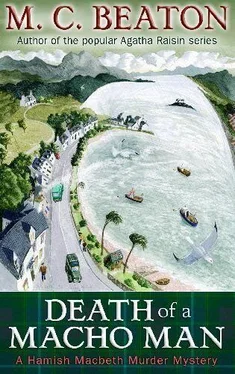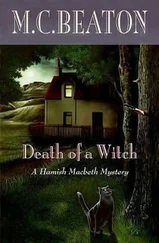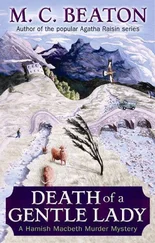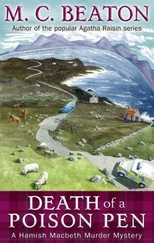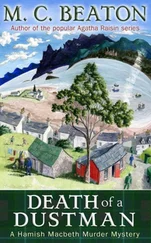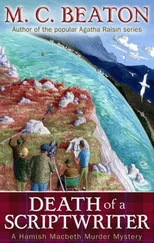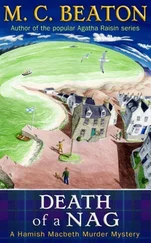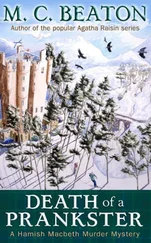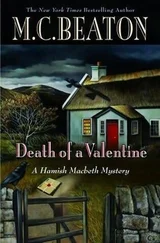M.C. Beaton - Death of a Macho Man
Здесь есть возможность читать онлайн «M.C. Beaton - Death of a Macho Man» весь текст электронной книги совершенно бесплатно (целиком полную версию без сокращений). В некоторых случаях можно слушать аудио, скачать через торрент в формате fb2 и присутствует краткое содержание. Жанр: Старинная литература, на английском языке. Описание произведения, (предисловие) а так же отзывы посетителей доступны на портале библиотеки ЛибКат.
- Название:Death of a Macho Man
- Автор:
- Жанр:
- Год:неизвестен
- ISBN:нет данных
- Рейтинг книги:3 / 5. Голосов: 1
-
Избранное:Добавить в избранное
- Отзывы:
-
Ваша оценка:
- 60
- 1
- 2
- 3
- 4
- 5
Death of a Macho Man: краткое содержание, описание и аннотация
Предлагаем к чтению аннотацию, описание, краткое содержание или предисловие (зависит от того, что написал сам автор книги «Death of a Macho Man»). Если вы не нашли необходимую информацию о книге — напишите в комментариях, мы постараемся отыскать её.
Death of a Macho Man — читать онлайн бесплатно полную книгу (весь текст) целиком
Ниже представлен текст книги, разбитый по страницам. Система сохранения места последней прочитанной страницы, позволяет с удобством читать онлайн бесплатно книгу «Death of a Macho Man», без необходимости каждый раз заново искать на чём Вы остановились. Поставьте закладку, и сможете в любой момент перейти на страницу, на которой закончили чтение.
Интервал:
Закладка:
“For talking to a reporter,” said Jimmy, ticking off the offences on his fingers, “for investigating on his own and not reporting in when his photo was in the papers and calls on the radio, for hiring a car with a dead man’s driving license, for having driven a police vehicle to Glasgow without permission, for having borrowed a gun and shot someone without permission, and I think all that’s just for starters.”
“But if he had done everything by the book,” said Mrs. Wellington, “you’d never have caught this Gentleman Jim; in fact, you’d probably never have known who he was!”
“Could be, but tell that to Strathbane.”
“This is dreadful, dreadful,” said Jessie, as much for Hamish now as she had so recently been against him. “Something must be done.”
Customers coming out of the shop were hailed and told the bad news about Hamish and by lunch-time everyone in the village knew that Hamish Macbeth was due for the chop. Feelings began to run high. Hamish was their policeman, and no one from the ‘big city’ was going to dictate to them whom they should or should not have.
At three o’clock that afternoon, Superintendent Peter Daviot was hosting an emergency meeting of all senior police officers in the Highlands.
“So you see,” he said, after reading out a list of Hamish’s iniquities, “although we are very glad to have this case wrapped up, we cannot possibly have a police constable who goes on like a Wild West sheriff. I think we should wait until the fuss has died down and then quietly tell him to leave the force. I have quite a good fellow lined up for the job in Lochdubh, PC Trevor Campbell.”
“Let me see the report on him,” said a chief constable. Mr. Daviot reluctantly handed a folder over.
“Dear me,” said the chief constable and Mr. Daviot looked at him impatiently. The man had a fat, round, red face above a tight shirt collar. Mr. Daviot thought it looked like a face painted on a balloon.
“Campbell seems to be accident-prone, to say the least. Added to that, he barely reaches regulation height and he just scraped through his exams.”
“We don’t exactly need anyone brilliant to police a Highland village,” said another.
A thin man with a clever face raised his voice. “What you must realize,” he said, “is that we are all sitting round this table deciding to get rid of a constable who, by his own initiative, caught Scotland’s biggest and most wanted criminal. I say, let’s keep him and promote him. If you don’t want him, I’ll take him back to Glasgow with me.”
“We have thought of promoting Hamish Macbeth before,” said Mr. Daviot wearily. “He was actually promoted to sergeant.”
“Oh, big, fat, hairy deal,” commented the thin man.
“And,” continued Mr. Daviot, “we had to demote him over that business of Pictish man. Macbeth caught the murderer, yes, by confronting her with a dead body. But it was the wrong body, if you remember. A fine example of Pictish man, and we were under fire from every professor and archaeological buff in the country over disturbing a rate corpse and removing it from its burial site. But the main difficulty, and I think this explains why Macbeth is such maverick, is that he has no ambition to be other than a village policeman.”
There was a startled silence while a roomful of men who had clawed their way to the top digested that bit of information.
“No, I say,” said Mr. Daviot, “that we simply wait until the fuss has died down and then get rid of him.”
“On what pretext?” demanded the thin man.
“I’ll think of something,” snapped Mr. Daviot.
“It won’t answer,” said his tormentor. “You cannot dismiss a policeman without a full inquiry, which would bring Macbeth back to the attention of the press. This detective, Blair, now, who appears to have been motivated by a certain degree of stupid spite – what has happened to him?”
“Nothing,” said Mr. Daviot. “He did his job. He had a confession from Beck. The man was most convincing. If he was prepared to stand up in court and plead guilty to both murders. We need good, obedient detectives like Blair-on the force. He may be a bit truculent at times, but surely, gentlemen, you must admit that Macbeth’s methods are enough to try the patience of a saint. I suggest we have discussed this long enough. I shall put it to the vote. You will find paper in front of you. Helen will go round with the box and collect the results and then I will count them.” His efficient secretary waited until they had all scribbled on pieces of paper and folded them, and then she went round with a square wooden box with a slot in the top, collected them and placed the box in front of Mr. Daviot, who opened it. He separated the ‘For’ and ‘Against’ into neat piles. His secretary watched avidly. She loathed Hamish.
“That’s that,” said Mr. Daviot finally. “Macbeth is to be dismissed at a convenient moment.”
Helen slipped out of the room. Blair and several others were waiting at the end of the corridor outside. Helen grinned at them and turned her thumb downwards.
“Oh, happy day,” said Blair. “The drinks are on me.” But the others shuffled off with long faces, leaving him standing glaring after them.
Inside the conference room, the men moved on to other business until at last Mr. Daviot said, “That’s that.” He rose to his feet. “Refreshments in the adjoining room, gentlemen. A drink before you leave.”
They all rose and followed him through to a room where a long table of drinks and canapes was laid out. Soon the air was thick with smoke and conversation.
Helen opened a window to let some of the cigarette smoke out. The day was sunny, the rain had stopped at last, and she felt happy. No more would Hamish Macbeth look at her with that mocking glint in his eye as if he found her somewhat ridiculous.
Bertie Laver, a detective chief inspector from Caithness, cocked an ear. He was an old friend of Daviot’s. “Is that the pipes I hear?” he asked. “Got a parade today?”
“Not that I know of,” said Mr. Daviot. “Helen, has any group asked for permission to hold a parade?”
“No, sir.”
The skirl of the pipes sounded nearer, followed by the sound of a band. Men began to move to the windows.
Mr. Daviot joined them and looked down, an amused smile fading from his lips.
Down the street towards police headquarters marched the villagers of Lochdubh, led by a piper and the school band murdering ‘Scotland the Brave.’ They were carrying placards: SAVE OUR POLICEMAN. WE WANT HAMISH. And, worse than that, two press photographers were running down the street, cameras at the ready.
“You didn’t tell us this Macbeth was so damned popular,” said Bertie.
“I didn’t quite realize…” said Mr. Daviot miserably.
“I mean, Blair said…”
Bertie eyed him cynically. “Man, man, that Blair’ll be the ruin o’ ye, Peter, if you listen to any more he says.”
The crowd gathered below them.
“I’ll go down and see what they want,” said Mr. Daviot.
Backed by Bertie, he hurried down the stairs.
At first he thought the large tweedy woman addressing the villagers and all the curious of Strathbane, who were gathering in increasing numbers to listen, was using a megaphone.
But then he recognized Mrs. Wellington, the minister’s wife, and realized it was her own booming, unaided voice.
“They have no right at all,” Mrs. Wellington was saying, “to take our constable away from us without consulting our wishes. Are we going to be dictated to by Strathbane? By London? By Brussels?”
“NO! NO! NO!” howled the crowd.
A camera flash went off in Mr. Daviot’s face.
“Do something,” hissed Bertie.
Читать дальшеИнтервал:
Закладка:
Похожие книги на «Death of a Macho Man»
Представляем Вашему вниманию похожие книги на «Death of a Macho Man» списком для выбора. Мы отобрали схожую по названию и смыслу литературу в надежде предоставить читателям больше вариантов отыскать новые, интересные, ещё непрочитанные произведения.
Обсуждение, отзывы о книге «Death of a Macho Man» и просто собственные мнения читателей. Оставьте ваши комментарии, напишите, что Вы думаете о произведении, его смысле или главных героях. Укажите что конкретно понравилось, а что нет, и почему Вы так считаете.
